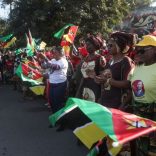Mozambique: Independence day attracts vendors to stadium, optimism about future
Mozambique: More than US$1.8 million diverted from Treasury Directorate – Audio

File photo: Voa Portugues
About 123 million meticais (approximately US$1.8 million) has been diverted from the National Directorate of the Treasury of Mozambique, in a corruption scheme allegedly involving seven institution employees.
For some analysts, this indicates that, despite official pronouncements, corruption is not being successfully addressed, and the country needs structural reform, as simply arresting people is not enough.
The news was broadcast on public television channel TVM, citing a source from the Attorney General’s Office (PGR), who indicated that 12 individuals had been named official suspects [arguidos] over the fraud, whose supposed mastermind – as yet unidentified – is reportedly still at large.
Some of the defendants were arrested.
The same source added that the embezzlement, which allegedly involved officials from the National Treasury Directorate and some commercial banks, began in 2016, with the last act taking place in 2018, when around 20 million meticais were diverted.
“The recurring way in which public money was diverted is strange, because President Nyusi chose the fight against corruption as one of the priorities of his governance,” Professor Cândido Ernesto says.
In addressing the issue of corruption in Mozambique, jurist Tomás Vieira Mário notes that, over the years, there has been a lot of discursive investment, which has not produced the desired effects.
“The country is, desperately, waiting for a solution. As far as we have come, I think it is really a structural issue. Structural reform of our state is necessary, even at the constitutional level,” Vieira Mário stresses.
Analyst João Mosca says that, although some high-profile cases of high level corruption have attracted attention, among them the so-called ‘hidden debts’, the fight against corruption at all levels is still not being felt, because “it is very difficult to accomplish and involves many factors of an economic and social nature”.
However, at an official level, there is an understanding that the exercise is still in its early stages, “despite the fact that, in recent times, state leaders at various levels have been brought before the bar of justice, something which has not happened before”.












Leave a Reply
Be the First to Comment!
You must be logged in to post a comment.
You must be logged in to post a comment.